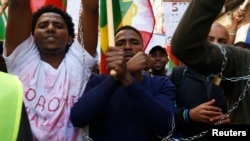Schools are closed, businesses have just reopened after being closed for almost a week, and there is tension in Ginchi, Ethiopia, one of the first towns where the Oromo people began protesting last month against a plan to expand the capital, Addis Ababa.
Police are on the main road in Ginchi, which is about 80 kilometers west of Addis Ababa. Interviews have to be conducted on the basis of anonymity and on the outskirts of the town.
A waitress says that despite the reopening of the cafe where she works, life is not back to normal yet: She says that there is not an official curfew, but that young people risk being randomly detained if they are out in the evening.
The most recent protest in Ginchi was last weekend, after a funeral. Citizens said security forces killed three people before the protest took place.
The Addis Ababa master plan is a blueprint to expand the capital into the Oromiya region. The protesters believe that the expansion will lead to land grabs without proper compensation and a loss of the Oromo culture and language.
A shop owner, who participated in the protests, says those who created the master plan do not understand that life is tough and that people like him will not benefit from the promised development. He says there is no benefit for the people to have outside investors who take their land.
Established in 1991
The Oromiya region was established when the current government came to power in 1991. The federal system was divided along ethnic lines. The Oromos are the largest ethnic group in the country.
Bekele Gerba, leader of the opposition Oromo Federal Congress, lives in Adama, the former capital of the Oromiya region. The city, about 60 kilometers south of Addis Ababa, has also seen protests in recent weeks.
Gerba says Oromos have never been treated like equals by Ethiopia's leaders, but he believes the current government is the worst.
“The ruling classes, usually, they think that Oromo is a threat," he said. " 'One day they can overwhelm us. Therefore, they have to be treated in such a way so that they won't have any power.' Therefore, for example, we don’t have any power in the military. All the military commanders belong to a different ethnic group.”
Gerba’s party says more than 75 people have died since the protests began, and that many of his party members have been detained. Rights organizations such as Human Rights Watch say the government is using "excessive lethal force" on the protesters.
A government spokesman, Getachew Reda, told VOA on Wednesday that security forces had exercised restraint, "even under circumstances where they found themselves overwhelmed."











